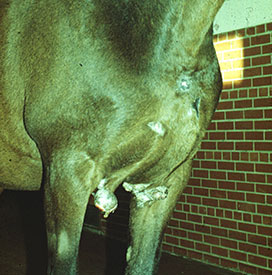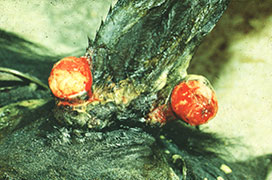Genetic studies of equine sarcoid tumors

Baker Institute for Animal Health
235 Hungerford Hill Road
Ithaca, NY 14853
Phone: (607) 256-5633
Fax: (607) 256-5608
dfa1@cornell.edu
The goal of this project is to advance our understanding of the pathogenesis of equine sarcoid skin tumors with the objective of developing improved methods of prevention or treatment. Equine sarcoid is the most common equine tumor. Although rarely malignant, sarcoids often cause loss of use of horses because of their location around the eyes, ears, or in the girth area. Sarcoids belong to the class of tumors that have a viral origin. Bovine Papilloma Virus (BPV) has been strongly implicated as the causative agent. One intriguing aspect of sarcoids is the association of susceptibility with specific horse breeds. This breed predisposition suggests a genetic basis for susceptibility, and recently our group and others have identified genetic polymorphisms on several chromosomes associated with occurrence of sarcoids. Our genetic studies have confirmed an earlier association of sarcoid with alleles of the equine Major Histocompatibility Complex (MHC). A second puzzling aspect of sarcoids is the variety of clinical manifestations of the tumors, ranging from small raised plaques that can be self-limiting and slow-growing (mild sarcoids) to large fibrous masses with rapid growth that recur irrespective of the treatment applied (severe sarcoids). This proposal brings together the genetic associations and the variety of clinical manifestations in a project aimed at elucidating the host genes responsible for the natural history and behavior of equine sarcoids.





